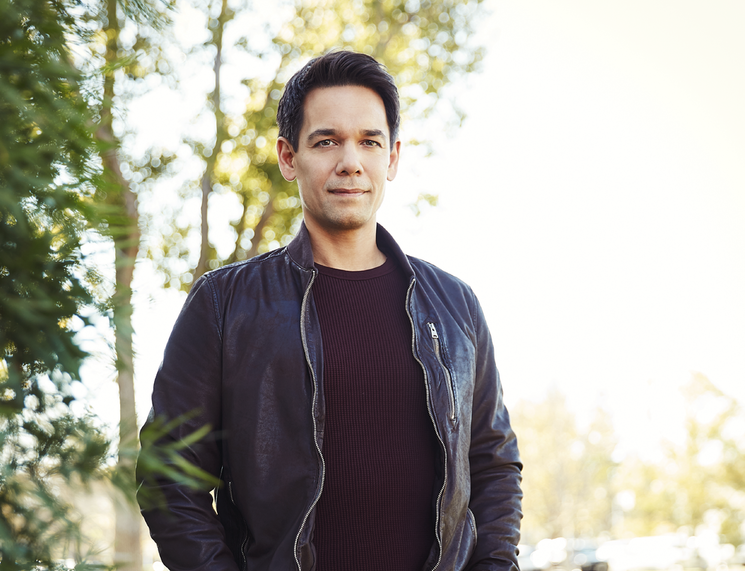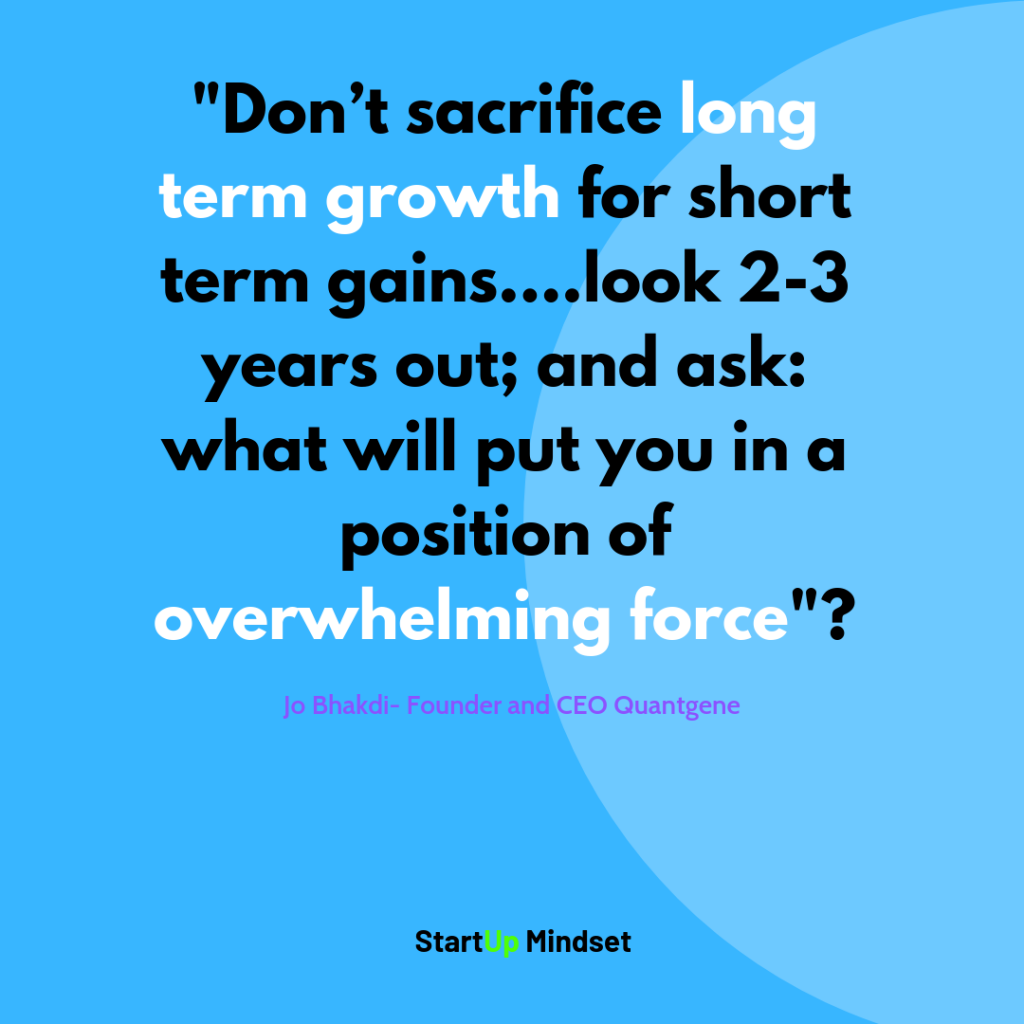As entrepreneurs, we sometimes feel the pressure to move as fast as we can to grow and generate revenue. The pressure can come from investors, our peers, or even our own minds. But, if we are patient and focus on the long run, we may be able to accomplish extraordinary things, fly way ahead of our competition and, possibly, change the world forever. That’s where Jo Bhakdi and Quantgene find themselves.
Jo Bhakdi founded Quantgene, and raised over $6M in his Series A. A pioneer in precision medicine, Bhakdi’s utilization of big data combined with advanced DNA analysis detects dangerous diseases with unprecedented accuracy before symptoms even occur. Unlike other DNA-centered initiatives which look for variants against our reference genome to detect abnormalities, Bhakdi’s company can read millions of DNA fragments at a time, achieving single molecule precision; truly changing the game for healthcare and making reactive medicine a thing of the past.
In this week’s interview, we’ll talk with Jo and his company’s world-changing technology as well as his experience building his incredible startup. When you’re done reading the interview, don’t forget to follow Jo on Twitter.
Q: Welcome to StartUp Mindset, Jo. We’re very excited to have you here. For the readers who are not familiar with you, could you tell us a little about yourself and your background?
Thanks for having me! I am an economist with a background in quantitative finance and economic theory, so not what you expect from a bioengineer. My parents were both scientists and I basically grew up in a lab and loved it; maybe that explains how I got here (laughs). But ultimately, biotechnology is currently going through a great transition from looking through microscopes to deploying big data centers and computational strategies, and that’s where I excel. This shift helped us to build the unique data and laboratory infrastructure that allows us to do these amazing things: to investigate blood samples with single-molecule precision and read out individual DNA fragments from thousands of cells with the highest level of accuracy.
Q: You’re currently the founder and CEO of Quantgene. Tells us more about the company and how you started it?
The idea came to me in 2014 when I was looking at the biotech sector and technology trend, more from a financial perspective. I got involved with a company that looked at circulating tumor cells in blood samples and helped them with some computational questions in genomics. While I was doing this, it hit me: there is an enormous technological opportunity that the rest of the world was not seeing. It has to do with applying advanced statistics and machine learning to questions about mutations in cancer. I called up some friends who were experts in oncology, genomics and data processing and we started building what is now the Quantgene ex-ante analytics engine.
This is one of the key components that allow us to detect cancer earlier and with much higher precision than ever before. Once we cracked that, it became obvious that this could be a big deal…so I went out, raised some money and assembled some of the best teams in sequencing assay development, clinical evidence generation and oncology. Today, we are very close to changing medicine and creating a new layer of extreme precision diagnostics, starting with cancer detection and oncology.
Q: Quantgene is a platform that utilizes advanced machine learning to detect the 10 deadliest cancers at early stages with standard blood samples. That sounds amazing! How are you able to do this?
On the technical side, I used to joke what we do is not rocket science. Today, I reverse my stance: what we do is pretty much exactly like rocket science. It consists of an extremely complex platform with dozens of technology layers across genomic data analytics, machine learning, statistical analysis, chemistry components, sequencing processes and laboratory quality control combined with clinical analysis and implementation into the standard of care. Each of these layers consists of hundreds of little steps and processes. If a single component fails, the final outcome will be dysfunctional. In a way, it’s like a rocket: it’s made out of comparatively simple components and steps, but it’s a lot of these components – and if a single one fails, the rocket blows up.
The key to making all of this work, especially with something so fundamentally new and more advanced as the Quantgene platform, is to create a culture of radical innovation. Every single team member involved in R&D is a high-resolution, critical thinker and extremely conscientious. We need to rely on everyone, from the people who develop algorithms to those who set up servers and data infrastructure to the ones developing the chemistry that goes into our assays and the technicians who implement our new sequencing procedures to be 100% on top of their game.
It was extremely challenging getting the right people in the right position; but now that everything works, it’s one of the great pleasures in my life. I love efficiency in radical innovation. To make this radical innovation work, I developed a few paradigms that I found to be highly effective. One is that small teams of 2-3 people for innovation tasks are key – smaller is better. Another one is that some level of not looking outside is actually very productive when it comes to developing big leaps in science and technology. I call this “institutional autism”. Most people are not good in developing effective theories about the world, so often it’s better not to ask what other people think, but develop your own theories with precision and rigor.
Q: Quantgene is definitely a revolutionary company. I think it is safe to say that when launching and growing a world-changing company, you experience some unique challenges. What is one of the biggest challenges you had to overcome in order to build Quantgene and how did you overcome it?
There is the old story of Steve Job and his “reality distortion field”. You definitely need that. You have to acknowledge reality to some degree… but never accept it. One of the things that helps me most in adverse situations (and there are many) is a clear vision of the future: I know exactly what the future of medicine has to look like. I know exactly how many hundreds of thousands of people we could save today every single year in the US alone. And we have the technology to do that. When an investor asks us why our clinical trial results are delayed for 2 weeks, or when I feel exhausted from overusing my brain, focusing on the big picture is tremendously helpful. That’s my one tip to entrepreneurs and pioneers: the current reality can never give you enough purpose and power to survive. But a vision that is big enough, and that you are sure enough of, grants you nearly limitless power to overcome obstacles because it puts it all in perspective.
Q: You started your career in advertising strategy before eventually founding your companies. How do you think that experience prepared you to be an entrepreneur?
Right out of University, I started as a strategy consultant at JWT, the oldest and one of the world’s great advertising agencies. I got very lucky to have an excellent mentor, F.M. Schmidt, who showed me how powerful it is to combine creativity with strategy. Starting in a strategic consulting position and working with many of the world’s largest companies was great because it showed me how big corporate America and Europe work. There are many things that large corporations do incredibly well and some they are incredibly bad at, one being hard innovation.
Q: What growth strategy has worked best for you and why do you think that particular strategy worked so well?
Don’t sacrifice long term growth for short term gains. At Quantgene, it took us three years to build the world’s leading precision medicine platform. This is deep, complex technology and from the outside, it looks like you are not making progress during these three years. But once you are done, you are in a market of one. As Peter Thiel would say, you go from zero to one. Today, we have no competition, because no one else is anywhere close to us. They were all too busy convincing their investors along the way they are making all that progress, while we were actually engineering that progress instead of talking about it. I recommend to be strategic; look 2-3 years out; and ask: what will put you in a position of overwhelming force? You don’t want to compete. You want to dig in for a few years, and then come out and present a solution that provides the foundation for a new world.
Q: What advice would you give to the reader that has a scalable business that is not reaching its full potential?
If it’s a technology business, I recommend you put R&D and tech superiority first. Think about what would give you a vast advantage in the market and what would deliver a step change in value. Then find the leanest, fastest engineering solution to getting there. Everything else, in my opinion, is business noise.
Q: What mindset or trait do you think every entrepreneur must possess in order to become successful?
I think every entrepreneur should have that fire in their belly every morning when they wake up and be able to articulate very clearly the intricacies of their passion. It is important to understand where passion – at least the type I know – comes from: it comes from a vision. If you see something in your mind that is so powerful, so desirable for you and the world that it is worth risking everything for, then you found your passion. Bill Gates had a vision of a connected world with a PC on every desk; Elon Musk has a vision for a multiplanetary species; at Quantgene, we have the vision of saving hundreds of thousands of American lives through early detection and precision medicine. Once you develop this vision: a future that gives you all the fire and motivation to build it – and combine it with skills and competence to engineer that future, you are golden. You cannot fail, because you will always try until you succeed. It’s a simple energy equation
For more on Jo Bhakdi and the amazing things happening at Quantgene, follow Jo on Twitter @JOBhakdi










